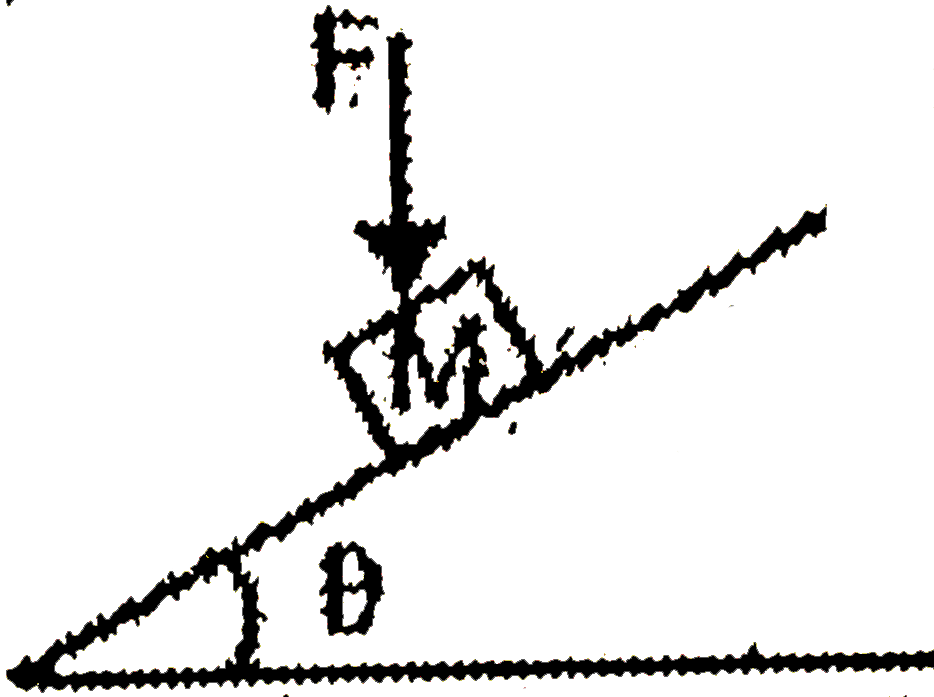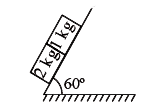A particle is at rest on a rough horizontal plane . The plane is slowly titled until the particle starts to move and is then kept fixed . If the static and kinetic coefficients of friction are μs and μk(<μs) respectively , show that the velocity of the particle after it has travelled distance d is given by :
v=
⎷2(μs−μk)gd(1+μ2s)1/2
Let the inclined plane makes an angle α with the horizontal . In equilibrium position :
mg cos α−R⇒R=mg cosα
mg sin α−Fs=0⇒Fs=mg sinα

∴ μs=FsR=tanα
During the subsequent motion , the equations of motion are
mg cos α−R=0⇒R=mg cos α
mg sin α−Fk=ma⇒Fk=mg sin α−ma

∴ μk=FkR=mg sinα−mamg cosα
= tan α−ag cosα
= μs−ag cosα
or a=(μs−μk)g cosα
⇒a=(μs−μk)g(1+μ2s)1/2
As acceleration of the body sliding down an inclined plane is constant ,
v2=2ad=2(μs−μk)gd(1+μ2s)1/2
∴ v=
⎷2(μs−μk)gd(1+μ2s)1/2
Topper's Solved these Questions
- BOOK - GRB PUBLICATIONCHAPTER - FRICTION AND CIRCULAR MOTION EXERCISE - Problem For Practice23videos
FRICTION AND CIRCULAR MOTION
- BOOK - GRB PUBLICATIONCHAPTER - FRICTION AND CIRCULAR MOTION EXERCISE - OBJECTIVE QUESTIONS ( only one choice is correct )80videos
FRICTION AND CIRCULAR MOTION
- BOOK - GRB PUBLICATIONCHAPTER - FORCE AND NEWTONS LAWS OF MOTIONEXERCISE - Comprehension12videos
FORCE AND NEWTONS LAWS OF MOTION
- BOOK - GRB PUBLICATIONCHAPTER - MOTION IN A STRAIGHT LINEEXERCISE - Comprehension type Queston14videos
MOTION IN A STRAIGHT LINE
Similar Questions
Knowledge Check
- Question 1 - Select One
A particle is projected up a rough inclined plane of inclination θ and friction coefficient μ. If the time of ascent is half of the time of descent, the friction coefficient μ is equal to
A34tanθB35tanθC45tanθD12tanθ - Question 2 - Select One
If coefficient of static friction is μs and coefficient of kinetic friction is μk , which one is correct ?
Aμs=μkBμs>μkCμs<μkDμs≤μk - Question 3 - Select One
When a body slides down an inclined plane with coefficient of friction as μk then its acceleration is given by
Ag(μksinθ+cosθ)Bg(μksinθ−cosθ)Cg(sinθ+μkcosθ)Dg(sinθ−μkcosθ)
If μk is the coefficient of kinetic friction and μs the coefficient of static friction then generally
View SolutionA block is kept on a inclined plane of inclination q of length l. The velocity of particle at the bottom of inclined is (the coefficient of friction is μ
View SolutionA block is kept on an inclined plane of inclination θ of length l. the velocity of particle at the bottom of inclined is (the coefficient of friction is μ)
View SolutionA block of mass M is sliding down the plane. Coefficient of static friction is μs and kinetic friction is μk. Then friction force acting on the block is :
 View Solution
View SolutionWhen a body slides down an inclined plane with coefficient of friction as μk, then its acceleration is given by .
View Solution

